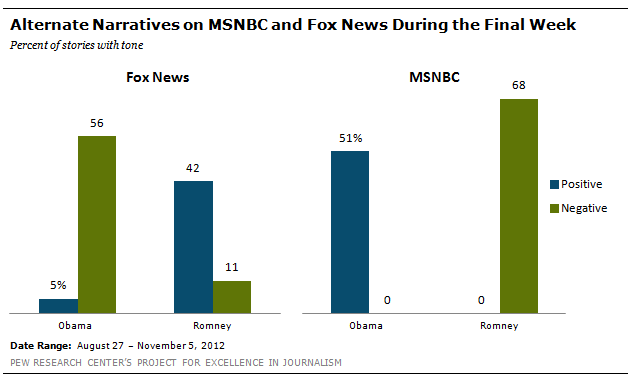In my opinion, the media in the United States is in a very decrepit state. As Jon Stewart points out nightly on the Daily Show, the bias presented by various networks is appalling. News has become less about informing people about facts, and more about telling people what their opinions should be. People tune in to the network that matches their already established political ideology, preventing them from seeing the world from more than one viewpoint, and making them less perceptive to the viewpoints of others. Although I obviously hold opinions of my own, I think that it is incredibly important for people to be capable of actually challenging what they believe, and to enter every argument with the knowledge that their opinion might actually be swayed. If people are so stubborn in their beliefs, arguments will devolve into pointless shouting matches that only serve to make both sides hate each other more. Unfortunately, this sentiment is provoked by our media, who often insult their counterparts on opposing networks, rather than attempt to intelligently refute their arguments.
The power of the media to influence public opinion, and even to provoke an entire movement, was demonstrated recently by the emergence and popularization of the Tea Party. One network aggressively promoted this movement, encouraging viewers to get involved in the movement by providing attendance and organization information such as protest dates, locations, and website URLs. The network’s website disseminated various information about the movement, and popular figures for the channel urged viewers to join them at Tea-Party events. This network was also rather one-sided in its support of the movement, blatantly attacking one political party with statements like, “in the case of the current crisis the blame appears to have been assigned almost totally to Obama, at least by the thousands of U.S. taxpayers attending near-spontaneous ‘tea parties’ in protest of the Democrats agenda of more taxes, increased spending, higher deficits and a surge of borrowing to pay for it all” (Peter Roff).
The bias in the media is certainly not one-sided. One television network was analyzed in the week leading to the election, and was found to have literally provided no positive coverage of the Republican candidate Mitt Romney.
I think that the bias in the media is the root of one of the deepest political issues that we have in this country, as it prevents civil discourse between individuals of separate ideologies, inhibiting compromise and progress.

Hey there, Josh! I think that your post really shows that you have a passion for the promotion of the truth. And you feel that maybe the media isn’t doing its job so well. I agree with you for the most part, actually.
But the statistics you gave concerning the positivity and negativity towards the candidates made me remember something: everyone has their own opinion. That’s why we have different news channels that are oriented towards different sides of the spectrum (hence the support for one candidate versus the other in different networks).
And although we expect that the media should be unbiased and present only facts, we are all human beings. It is always frustrating to see that we can’t read strictly factual news, but unfortunately, it’s not the reality. After all, human beings write the news reports, and they each have their own bias they wish to present and to have heard.
But keep up the good work, and stay passionate!
I cannot agree with you more on your first paragraph. I think the main problem that we have regarding deliberation, especially political deliberation, is the inability to admit that we’re wrong. It’s like we have too much pride to enter into a rational argument and have our views questioned. I don’t think you can say you believe something if you haven’t had it questioned and yes, sometimes that will mean you might have to concede that you’re wrong. It’s not the end of the world, and I think it actually shows intelligence and strong character. Just because you have to change your belief doesn’t mean that you’re stupid or that you can’t form your own beliefs, it means that you’re learning.
I think that people see the news as such an important source of information and most people do not consider the fact that what they are presenting on the news is biased or exaggerated. People put a lot of faith into different networks to report real life situations and facts to them and do not expect opinionated stories that make it more difficult for that person to form their own belief.
I completely agree that the media sources are trying to influence opinion. However it is their right to voice their opinion. That is one of the things that makes this nation great. Despite this, I agree that they should get their facts straight and not report false information. They should not be lying to our faces and expect us to just take it.
Bias in the media is definitely a major problem in our society, but I think that some of that has to do more with our attitude towards news than the actual problems with news stations themselves. We want to watch interesting stories presented quickly; we want instant coverage and don’t want to have to do any of our own thinking. It amazes me that people are so cautious when it comes to things like “Don’t believe everything you read on the internet” but they are so willing to take everything they hear on the news, including opinions, as absolute fact. Bias in the news is a problem, but the bigger problem is that we don’t question that bias and we don’t actively search for different views and/or the straight facts.